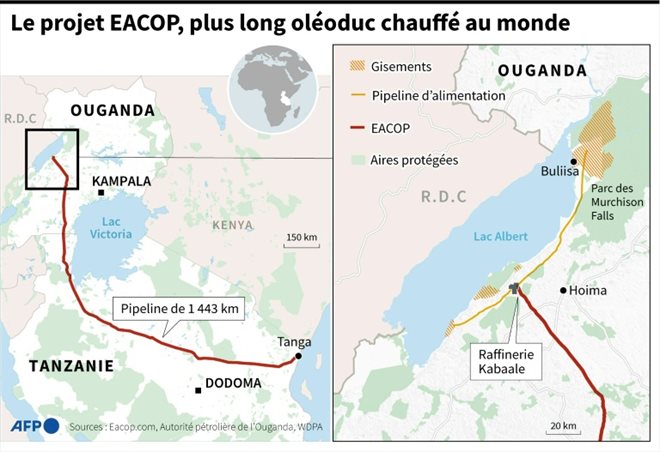The TotalEnergies group is criticized for a megaproject in Uganda and Tanzania (AFP/Archives/Lou BENOIST)
TotalEnergies once again in the sights of associations for “climaticide”: four environmental defense associations have filed a complaint against the group and its EACOP oil project in Tanzania and Uganda, we learned on Monday from their lawyers, confirming information from Le Monde.
Darwin Climax Coalitions, Sea Shepherd France, Wild Legal and Stop EACOP-Stop Total in Uganda filed the complaint on September 22.
“While the UN is concerned about the ongoing ‘climate collapse’, TotalEnergies must no longer continue to knowingly, freely and with impunity fuel climate change,” declared lawyers William Bourdon and Vincent Brengarth. “It is time for the company to be held accountable for its activities,” they added in a statement.
According to them, this complaint is “unprecedented” because it brings the company TotalEnergies “before the criminal court for acts resembling climaticide, and which, until now, had their place only before civil courts”.
The complaint targets several offenses: failure to combat a disaster, involuntary attacks on personal integrity, destruction, damage or deterioration of property belonging to others likely to create a danger for people, and involuntary homicide.
TotalEnergies “is not aware of this complaint and does not know what it targets”, reacted the company, contacted by AFP. “The company conducts its operations in accordance with its operating standards and with laws and regulations. It will respond to requests from the authorities if necessary,” she added.

The EACOP project, the longest heated oil pipeline in the world (AFP/)
TotalEnergies announced last year a $10 billion investment agreement with Uganda, Tanzania and the Chinese company CNOOC, including the construction of a 1,443 kilometer heated oil pipeline (EACOP) connecting the lake’s deposits. Albert, in western Uganda, on the Tanzanian coast on the Indian Ocean.
The group plans to drill nearly 400 oil wells in the Murchison Falls Nature Park – the White Nile Falls, among the most powerful in the world – a remarkable biodiversity reserve and Uganda’s largest national park.
– Contested project –
The project has encountered opposition from activists and environmental groups who say it threatens the region’s fragile ecosystem and the people who live there. At the beginning of July, Human Rights Watch called for it to be stopped, estimating in a report that it had already “devastated the livelihoods of thousands of people”.
For the associations’ lawyers, this project would lead to “significant population displacements” and “a major impoverishment of local populations”. It would also have a major impact on “many natural areas”, they emphasize.
The plaintiffs accuse the group of not taking “any action to combat the disaster which is already affecting half of the world’s population.” They denounce its communication strategy “aimed at giving the illusion of an ambitious environmental strategy in order to conceal the absence of concrete and appropriate actions” to fight global warming.
TotalEnergies had already been taken to court in October 2019 by Friends of the Earth, Survie and four Ugandan associations, who accused it of carrying out the EACOP/Tilenga project with disregard for human rights and the environment.
They were dismissed last February by the Paris court, which implicitly criticized the NGOs for not having sufficiently explored the path of dialogue with the oil giant before taking legal action.
Bourdon and Brengarth also recalled that according to the International Energy Agency, in order to respect the Paris climate agreement and “avoid an apocalyptic future”, it was necessary to “immediately renounce any new oil projects”.
However, TotalEnergies is the private oil company “which has approved the most new oil projects” for the period from 2022 to 2025, “which are totally incompatible with the Paris agreement and lead us straight towards a warming of +3 °C or +3.5°C” leading to “chaos”, according to the lawyers.
They now hope that “French justice will force TotalEnergies to radically change its investment strategy to drastically reduce fossil investments and massively develop renewable energies”, recalling that in the Netherlands, “justice forced the Shell group to reduce its CO2 emissions by 45% by 2030.
They are waiting for “the opening of an investigation as soon as possible”.
© 2023 AFP
Did you like this article ? Share it with your friends using the buttons below.




